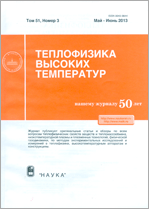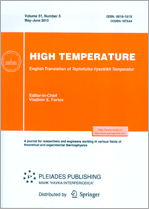|
|
Teplofizika vysokikh temperatur, 2007, Volume 45, Issue 5, Pages 733–740
(Mi tvt1185)
|
 |
|
 |
This article is cited in 12 scientific papers (total in 12 papers)
Heat and Mass Transfer and Physical Gasdynamics
The shock-wave mechanism of spontaneous ignition of hydrogen under conditions of sudden efflux from reservoir at high pressure
T. V. Bazhenova, M. V. Bragin, V. V. Golub, M. F. Ivanov
Joint Institute for High Temperatures, Russian Academy of Sciences, Moscow
Abstract:
Analysis is made of the conditions of spontaneous ignition of hydrogen as a result of emergence of a starting shock wave in air before an expanding cold flow of gas. The rise of temperature behind the shock wave causes ignition of the mixture of combustible gas with air, which forms on the contact surface. The condition for spontaneous ignition is the sufficient time of residence of mixture at high temperature for mixing and ignition. The calculations of spontaneous ignition of hydrogen jet are based on a model which takes into account the gasdynamic transport of viscous gas, the kinetics of oxidation of hydrogen, multicomponent diffusion, and thermal conductivity. The range of pressures is determined in a reservoir, during whose depressurization the shock wave forming in air exhibits intensity sufficient for igniting the hydrogen-air mixture behind the front of propagating jet of compressed hydrogen. Results of analysis are given of the dependence of conditions of ignition on the pressure of hydrogen in the reservoir, on the size of the outlet opening, and on the initial temperature of hydrogen and air.
Received: 06.06.2006
Citation:
T. V. Bazhenova, M. V. Bragin, V. V. Golub, M. F. Ivanov, “The shock-wave mechanism of spontaneous ignition of hydrogen under conditions of sudden efflux from reservoir at high pressure”, TVT, 45:5 (2007), 733–740; High Temperature, 45:5 (2007), 665–672
Linking options:
https://www.mathnet.ru/eng/tvt1185 https://www.mathnet.ru/eng/tvt/v45/i5/p733
|


|





 Contact us:
Contact us: Terms of Use
Terms of Use
 Registration to the website
Registration to the website Logotypes
Logotypes








 Citation in format
Citation in format 
